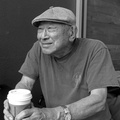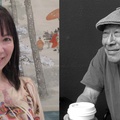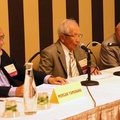Daytime we could get only two radio stations—small town stations in Medford and Klamath Falls, Oregon that played incessantly.
the women dug the lakebed
and turned up seashells
long dormant in the sand
sorted and cleaned
painted and shellacked
they became ornamental things
trinkets and necklaces
made in captivity
this is Radio Station KOBY in Medford, Oregonwe took pieces of 2 x 4
whittled and carved them
mine were unremarkable
but old Yoshimoto-san
always did women
a shelf lined with them
severe and woodbound
more Egyptian than Japanese
all frontal and nude
this is Radio Station KOBY in Medford, Oregonbaloney, hot and frothy
on the metal platter
they said it was horse meat
we ate it anyway
even made sandwiches
with mustard and mayonnaise
we rolled Bull Durhams
watched the girls
did nothing mostly
while we smoked
our homemades
this is Radio Station KOBY in Medford, Oregonwe liked to shower
in summer and winter
standing in wooden clogs
didn’t want to get athlete’s foot
turned on the hot and cold water
what a pleasure that was
but often they ran out of coals
then we couldn’t shower
we watched for smoke
from the furnace chimney
counted the days
we hadn’t showered
missed our showers
wanted to feel clean
this is Radio Station KOBY in Medford, Oregonwhat’s that old fart
doing in the shower room again?
copping looks at our genitals
okay creep
look all you want
there’s no charge
but don’t tell me
to shave my head
join the Hoshi-dan
become a fanatic Japanese
I’m here in protest
I am an American
want to be treated like one
I repeat
I am an American
naked as I am
so creep
get the hell out of my sight
this is Radio Station KOBY in Medford, Oregonhe was killed for no reason
just driving a farm truck
past the gate
ordered to get out
he did
and he was shot
by a nervous white boy soldier
we went to his funeral
thousands did
the whole camp almost
only our respect for the dead
held back our anger
sitting or standing
we bent the Tules
growing in the firebreak
this is Radio Station KOBY in Medford, OregonSo, you were in Tule Lake, huh?
Yeah.
I was there too.
Oh?
But I relocated early…to Chicago.
That so?
What did you do?
I stayed back.
You stayed, huh?
Go ahead ask it.
What?
I know you want to.
Oh, we don’t have to talk about it.
It’s all right, go ahead.
Were you a…no-no boy?
That’s right.
Heard you guys had trouble.
Some.
How long were you there?
You mean in prison?
Well…you know what I mean.
Three years ten months.
That long, huh?
Yep.
This is Radio Station KOBY in Medford, OregonSo you goin’ to the Tule Lake reunion?
Nah.
You know about it, don’t you?
Yeah, I heard.
Why aren’t you goin’ then?
Not interested.
Guess I’ll go.
Oh sure.
There’ll be singin’ and dancin’.
Like ole times, huh?
That’s right, partyin’ and dancin’, remember?
Check out the women?
Well…forty, fifty years…
Never too late, huh?
That’s right. Hubba, hubba.
Jitterbug?
Might give it a whirl.
Well, don’t go breakin’ your balls.
Say, why don’t you come along?
Nah.
Hell, it’s been forty, fifty years, water under the bridge, huh?
No sucker, not for me.
This is Radio Station KOBY in Medford, Oregon
*This poem was originally published in Swimming in the American, a Memoir and Selected Writings, San Mateo, CA, Asian American Curriculum Project, 2005.
* * *
* Hiroshi Kashiwagi will be speaking at “The Tule Lake Segregation Center: Its History and Significance” session at JANM’s National Conference, Speaking Up! Democracy, Justice, Dignity on July 4-7, 2013 in Seattle, Washington. For more information about the conference, including how to register, visit janm.org/conference2013.
© 2005 Hiroshi Kashiwagi







